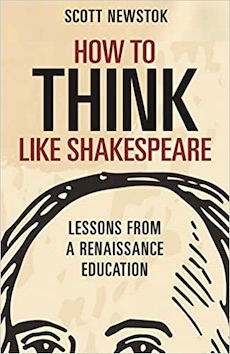By Louis J. Kern
Noted Shakespeare scholar Scott Newstok (ΦBK, Grinnell College) provides an engaging, witty, wide-ranging critique of contemporary pedagogical fads and a spirited provocation to return to classical and Renaissance models—the Progymnasmata (a writing and rhetoric curriculum), the Socratic dialectic method (teaching precise, active thinking), and the trivium and quadrivium (foundational liberal arts). In an electronically “distracted globe” he finds the techno-utopianism of Sebastian Thrun’s Udacity and its MOOCs illusory; rather than broad educational channels, they have devolved into runnels of remedial and corporate training. No Child Left Behind requirements, emphasizing standardized tests, impoverish curricula and encourage rote teaching. The “ed-tech industry’s fetishizing of means’” is a digital feedback loop inhibiting consideration of ends.
Newstok’s educational model stresses face-to-face classroom conversation and debate and imitation of the best models for training writing. He conceives the liberal arts as the disciplined pursuit of happiness, the “crafts of freedom”; “education as the practice of freedom.” Citing Martin Heidegger, he particularizes: “perhaps thinking, too, is just something like building a cabinet. At any rate, it is a craft, a ‘handicraft’.” Through creative “making,” grounded in cultivation and maintenance of a broad stock of ideas (intellectual tradition), homo faber becomes the Artifex, the fabricator of her/his destiny.
Newstok criticizes the Maker movement, with its focus on robotics, RepRap 3-D printing, and digital fabrication, for its prevalent preoccupation with STEM subjects to the subordination of the arts and its gender biases. His concern may be well-grounded insofar as maker philosophy has found expression in citizen science and open source labs replicating pharmaceuticals.
Newstok encourages not literally thinking like Shakespeare, but rather returning to a Renaissance educational ideal grounded in serious, disciplined intellectual work, imitation of best models of thought and writing, preservation of tradition, direct engagement with the foreign and the past, and a creative, playful approach suitable to our character as homo ludens. He unapologetically argues that to be “politically progressive, one needs to be an educational conservative.”
In addition to being an apologia for a classically liberal education—the end of training being production of a useful, virtuous citizen, since “precision of thought is essential to every walk of life”—this volume is a self-conscious handbook of quotations along the lines of Erasmus’ Adagia (1533), “useful for conferring beauty and distinction on all kinds of speech and writing.” There are scores of Shakespearean citations here, while others range from Eubulides’ sorites paradox (how many grains of sand must be removed from a heap before it ceases to be a heap?) to Bob Dylan’s Nobel Prize acceptance speech. Some are misconstrued, e.g. Nietzsche’s plea (Götzen-Dӓmmerung,oder: Wie man mit dem Hammer philosophiert, 1889) for education as an end in itself that seems inclusive but is actually a plea to restore Vorrecht (education as special privilege for the elite)—”pulcrum est paucorum hominem” (beauty is for the few).
Newstok places rhetoric at the center of education and stresses the need to imitate the best models of speech and writing. Such imitation, he maintains, is the essence of transmitted education and the foundation of independent thinking that is rooted in the past while usefully energizing the present. He rightfully distinguishes this “borrowing” from plagiarism. Presumably he would find the kind of postmodern misuse of tradition expressed in Scott Grahame’s Pride and Prejudice and Zombies (2009), the online Omegaverse, and Addison Cain’s fan-fic, lupine s/m series (2016-17) appalling. He cites Dylan’s “love and theft” of Shakespeare and African American folk music but would not, I think, sanction the same appropriation of Jim Crow blackface.
A book of heavy import, lightly tossed, it is at once instructive and amusing, elucidating why and how Shakespeare is good to think with. It shares something of the spirit of the BBC sit-com Upstart Crow (Robert Greene’s disparagement of the bard).
Louis J. Kern (ΦBK, Clark University) is professor emeritus of history at Hofstra University. Hofstra University is home to the Omega of New York chapter of Phi Beta Kappa.




